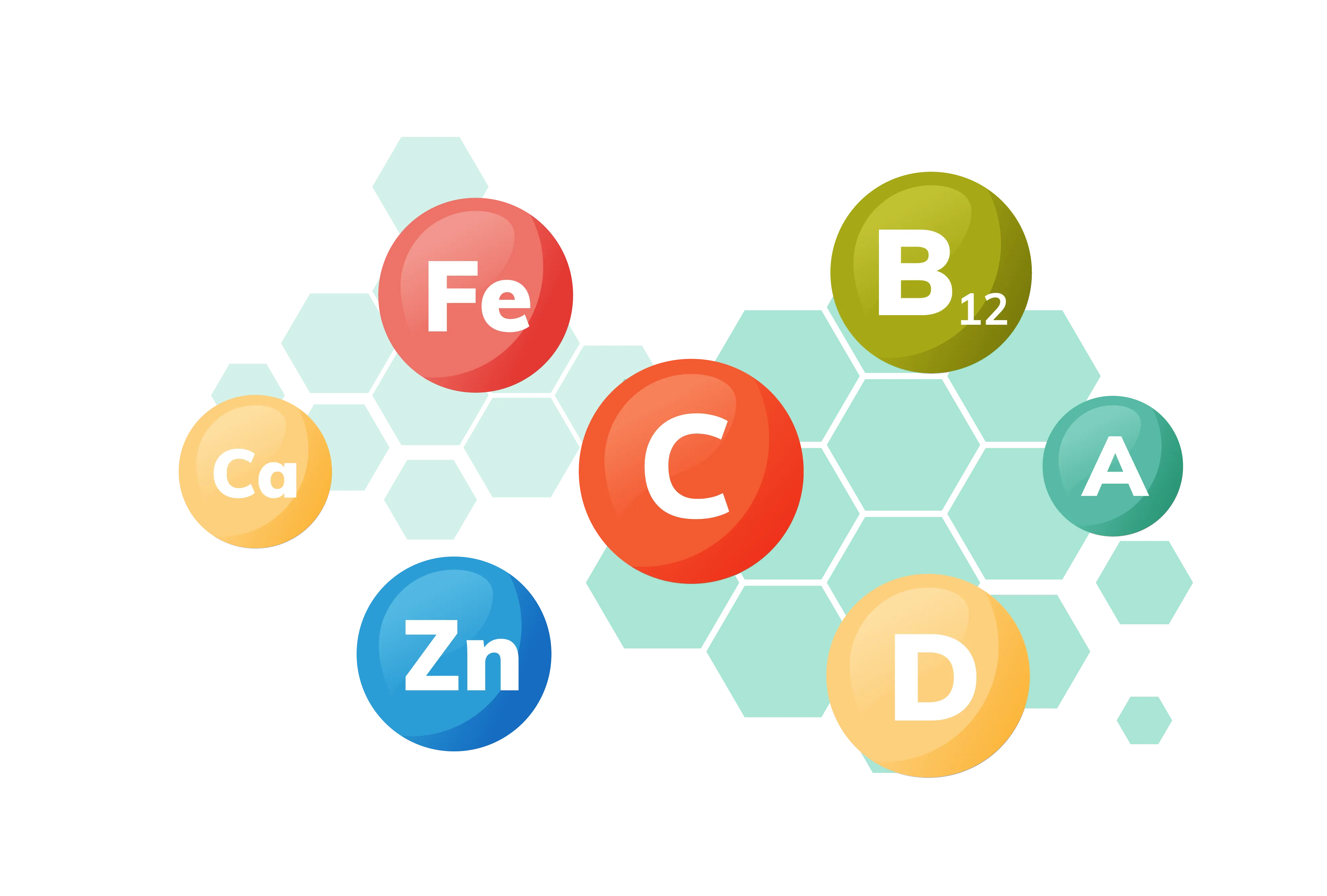Nutrition | 4 min read
5 Vitamin Deficiency Tests to Check Nutritional Deficiency
Medically reviewed by
Table of Content
Key Takeaways
- Iron deficiency is one of the most common nutritional deficiencies
- Vitamin C plays a major role in the growth and repair of body tissues
- Fatigue, weakness, dizziness are some symptoms of vitamin deficiency
Nutritional deficiency occurs when the body is deprived of vital nutrients. While macros like carbohydrates, proteins, and fats are essential for the body, do not ignore micronutrients. These include vitamins and minerals. They help the body fight against infections. A nutritional deficiency can result in several health ailments. As such, getting a regular vitamin deficiency test or a combined mineral and vitamin deficiency test is crucial.
Generally, the level needed depends on your age. The most common nutritional deficiencies affecting the body include iron deficiency and vitamin A, B1, B3, B9, and B12. Read on for a better idea of these tests and to understand the associated deficiencies.

1. Vitamin D Deficiency Test
Vitamin D is vital for bone and muscle health. It supports your immune system. About 1 billion people worldwide do not get the required vitamins D. Vitamin D deficiency has symptoms like muscle pain, anxiousness, tiredness, or weak bones. The best source of vitamin D is sunlight.
Vitamin D level is best measured with a 25-hydroxy vitamin D test. A range between 50-175 nmol/L is normal. A range between 75-100 nmol/L is optimal. Some foods to gain vitamin D include fatty fish, mushrooms, and egg yolks.
Additional Read: Signs and Symptoms of Vitamin D Deficiency
2. Vitamin B12 Deficiency Test
Vitamin B12 helps in the proper functioning of your nervous system. This vitamin is widely responsible for the production of healthy red blood cells. The symptoms of Vitamin B12 deficiency include fatigue, weight loss, nausea, dizziness, and pale skin. A lack of stomach protein known as the intrinsic factor is the most common cause of Vitamin B12 deficiency.
An active B12 blood test measures the amount of vitamin B12 available in your body for use. You can also opt for a total B12 test. An active B12 range between 37.5-188 pmol/L is normal. The normal range for the total B12 test is between 300- 569 pmol/L.

3. Iron Deficiency Test
Iron deficiency is the most widespread nutritional deficiency in the world. It can lead to anemia. More than 30% of the world’s population is anemic. [3] Iron deficiency is mostly found among pregnant women, infants, cancer patients, blood donors, or those with heart failure. The symptoms include fatigue, sleeping difficulty, headache, breathlessness, and depression.
There are several tests, including a blood test to check iron deficiency. Checks include your hemoglobin and serum ferritin levels. The normal range for serum ferritin is 13-150 ng/I for women and 30-400 ng/I for men. The hemoglobin should be 120-160 g/L for women and 130-170 g/L for men. Further, the total iron-binding capacity (TIBC) should be 45-72 umol/L for men and women.
4. Vitamin C Deficiency Test
Vitamin C plays a major role in the growth and repair of body tissues. Weakness, muscular pain, sunken eyes, and loss of appetite are some of the symptoms of vitamin C deficiency. Other symptoms include rough and bumpy skin, dry and damaged skin, easy bruising, slow healing of wounds, swollen joints, tooth loss, fatigue, stress, and low immunity. It can even lead to scurvy and anemia. [4]
A vitamin C blood test checks vitamin C deficiency. A capillary fragility test is also done to determine the same using a blood pressure cuff. You can consume vitamin C tablets or eat vitamin C-rich foods to prevent the deficiency. Citrus, red and green peppers, tomatoes, broccoli, and greens are good vitamin C sources.
Additional Read: Importance of Vitamin C
5. Mineral Panel Test
A mineral panel test identifies deficiencies by testing the blood for key minerals. The test involves minerals like calcium, iodine, magnesium, zinc, iron, and copper. An electrolyte panel tests the level of sodium, chloride, potassium, and bicarbonate. Electrolytes are minerals that hydrate the body, rebuild damaged tissues and help in muscle function.
A vitamin profile test, which checks Vitamin B12, Vitamin D, and folic acid, is a good first step to identify nutritional deficiencies and take necessary precautions. As a result, taking vitamin and mineral supplements can help boost the immune system, but only if done correctly. Ideally, it is always better to consume vitamin and mineral-rich foods to combat any nutritional deficiency. Whether you are opting for a routine blood test or due to a symptom, book an online lab test in seconds with Bajaj Finserv Health and work toward a clean bill of health. Avail Bajaj Finserv Health card and Get Rs. 2,500 Lab & OPD benefit which can be used across pan India.
References
- https://www.healthline.com/health/malnutrition
- https://www.biologyonline.com/dictionary/capillary-fragility-test
- https://www.healthline.com/nutrition/vitamin-c-deficiency-symptoms
- https://www.walkinlab.com/products/view/vitamin-c-blood-test
- https://www.healthtestingcenters.com/can-blood-test-detect-vitamin-deficiency/
- https://www.myonemedicalsource.com/2020/06/18/nutritional-testing/
- https://thriva.co/hub/vitamins/vitamin-and-mineral-blood-tests
- https://www.mayoclinic.org/diseases-conditions/vitamin-deficiency-anemia/diagnosis-treatment/drc-20355031
- https://health.mo.gov/living/families/wic/localagency/wom/pdf/341-definition.pdf
- https://www.hsph.harvard.edu/nutritionsource/vitamin-d/
- https://www.who.int/health-topics/anaemia#tab=tab_1
- https://ods.od.nih.gov/factsheets/VitaminC-HealthProfessional/
Disclaimer
Please note that this article is solely meant for informational purposes and Bajaj Finserv Health Limited (“BFHL”) does not shoulder any responsibility of the views/advice/information expressed/given by the writer/reviewer/originator. This article should not be considered as a substitute for any medical advice, diagnosis or treatment. Always consult with your trusted physician/qualified healthcare professional to evaluate your medical condition. The above article has been reviewed by a qualified doctor and BFHL is not responsible for any damages for any information or services provided by any third party.





